Items
Tag is exactly
information
-
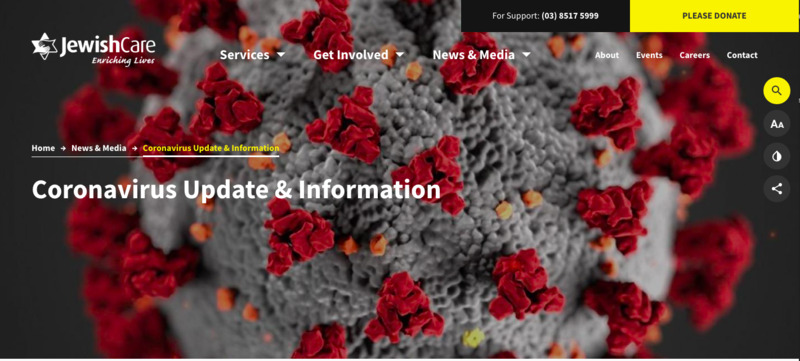 2020
2020Jewish Melbourne: Jewish Care Coronavirus updates
Jewish Care runs an aged care home, and so during the Covid-19 crisis they provided regular updates to their community. This was particularly the case when residents and staff tested positive. -
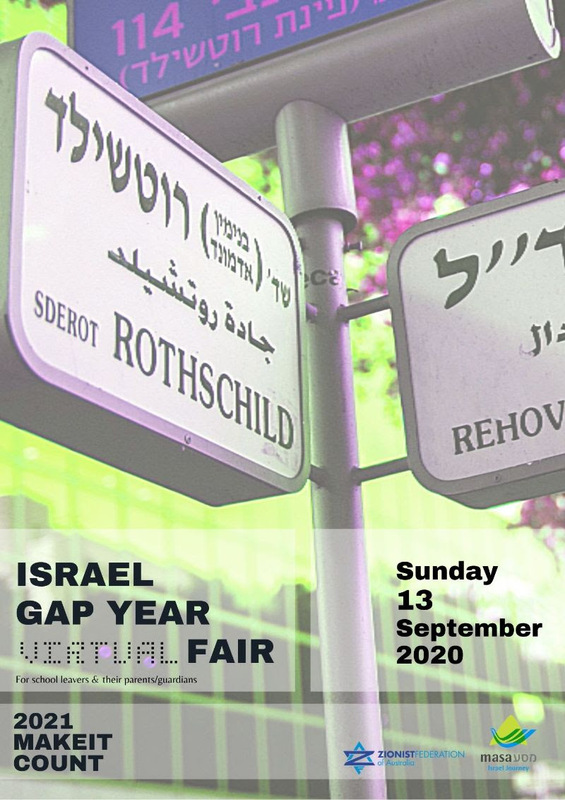 2020-08-28
2020-08-28Jewish Melbourne: virtual info session for Israel programs in 2021
Information from MASA and ZFA, in ZFA's weekly newsletter, about a "virtual info Gap Year Fair showcasing all the Israel Gap Year options available in 2021." These sessions were planned for 13 and 14 September. -
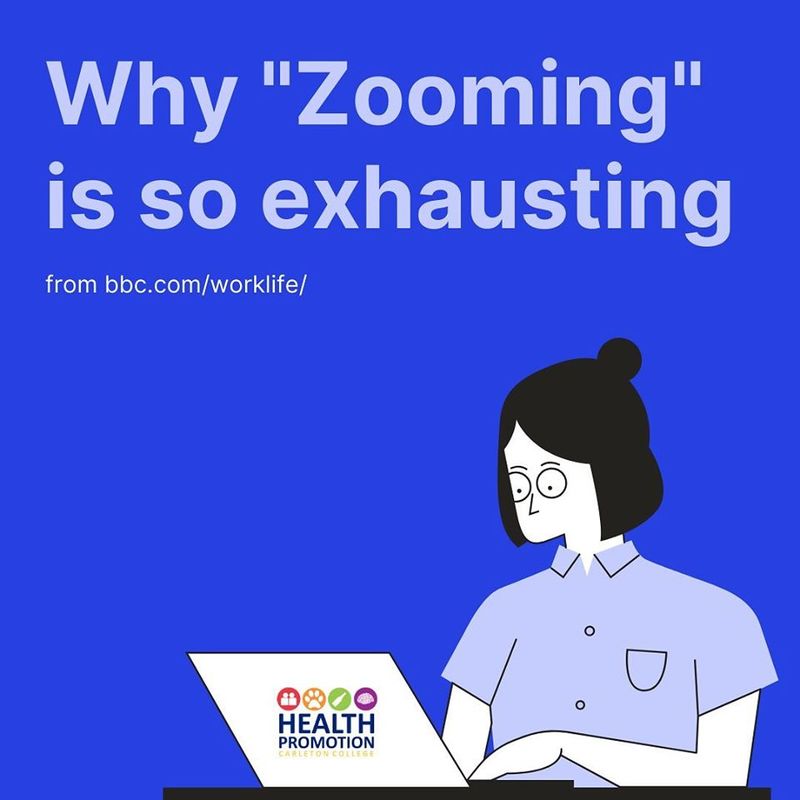 2020-05
2020-05Zoom Fatigue
With the pandemic came online learning and being forced into a class room situation where everything was mediated through our screens. I found this learning style to be mentally draining and had felt that I was alone in my experience when all I saw online was people celebrating the wonders of connecting through zoom. Seeing this infographic which acknowledges zoom exhaustion and breaks down why it happens and ways to overcome it was really nice. It shows that my experience is felt by many and while technology has allowed many of us to stay connected it isn't with negatives. HUM402 -
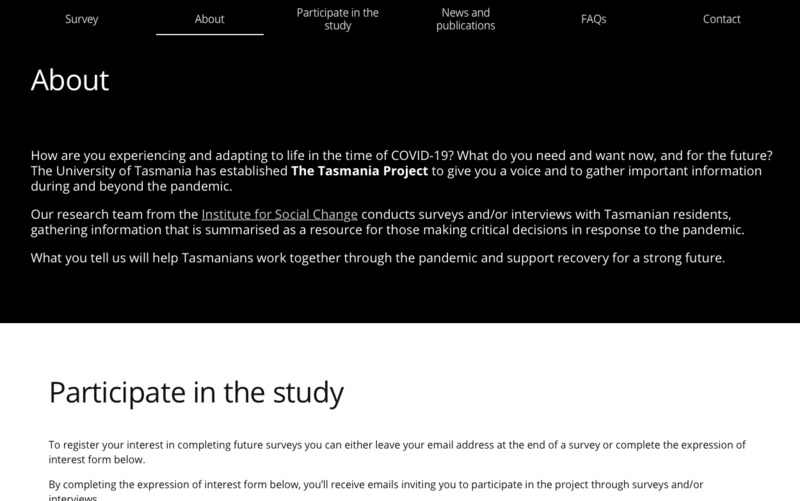 2020-04-24
2020-04-24The Tasmania Project
Project to gather information during and beyond the pandemic. -
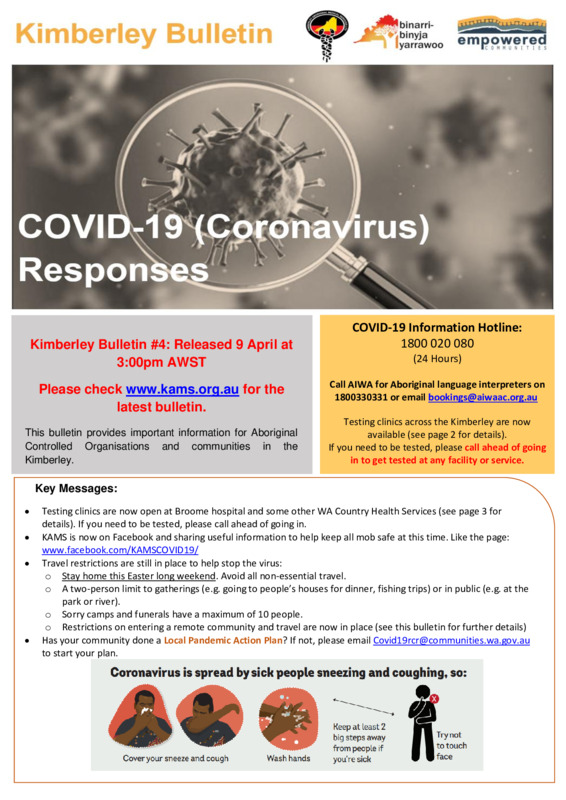 2020-04-09
2020-04-09Kimberley Bulletin: Covid-19 (Coronavirus) Responses
A regular Covid-19 bulletin issued to local indigenous community members and health providers describing hygiene practices, local travel and safe distancing restrictions, background information on covid-19 and available social support using terminology and cultural examples specific to the region. For example, a 'sorry camp' is special area where visiting relatives would stay when attending a funeral in a community, as communities can be extremely far apart. These are subject to the country-wide limit of a maximum 10 people at funerals current at the time of publication. Remote Aboriginal and Torres Strait islander communities are considered to be at higher risk of severe impacts from Covid-19 than the wider population due to their higher level of chronic health issues, frequently crowded households, and long distance from healthcare. The Kimberley region of Western Australia has unique travel restrictions in place to limit movement between the four Shires, in addition to restrictions on movement across different regions of Western Australia and lockdowns of individual indigenous communities. -
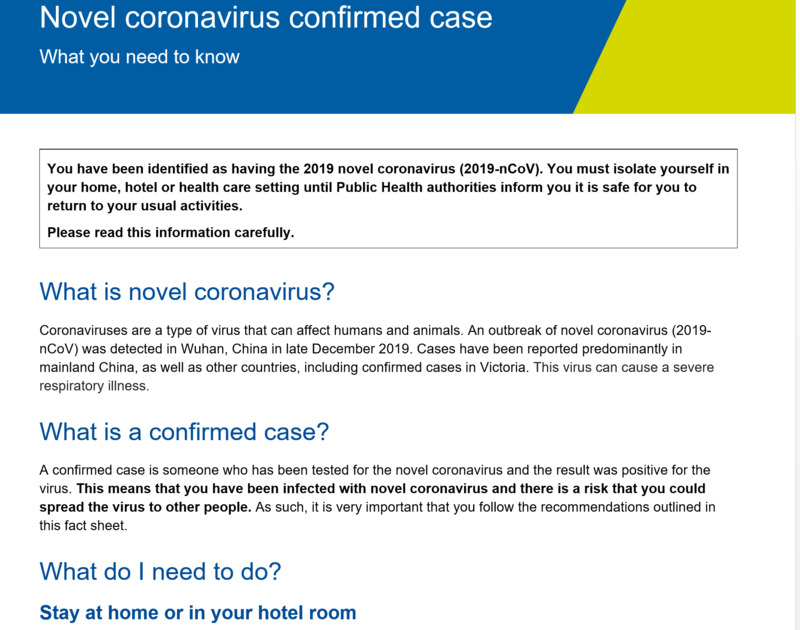 2020-02-11
2020-02-11Victorian State Government "Novel coronavirus confirmed case" fact sheet
Government advice to people who have "2019 novel coronavirus (2019-nCoV)". -
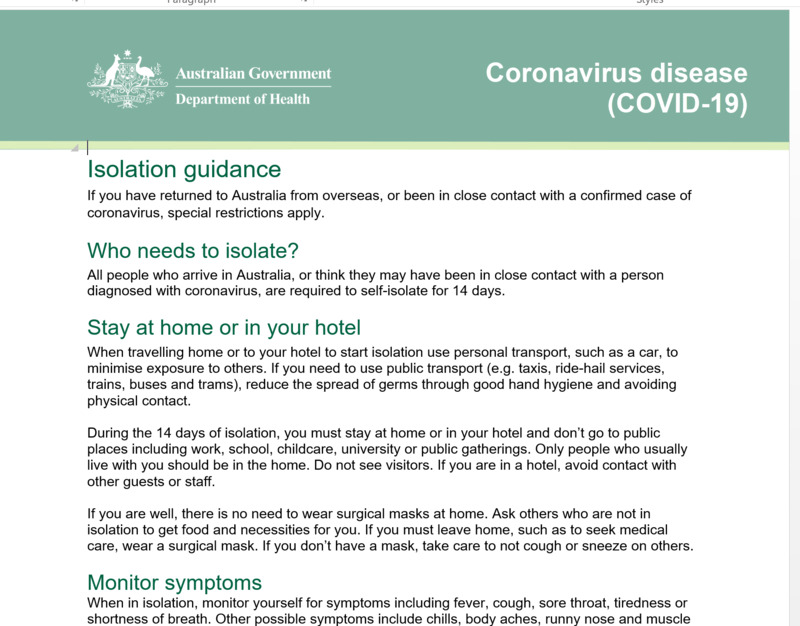 2020-03-23
2020-03-23Australian Government Isolation Guidance
Australian Government fact sheet with guidance on self-isolation, Version 14 Isolation guidance If you have returned to Australia from overseas, or been in close contact with a confirmed case of coronavirus, special restrictions apply. Who needs to isolate? All people who arrive in Australia, or think they may have been in close contact with a person diagnosed with coronavirus, are required to self-isolate for 14 days. Stay at home or in your hotel When travelling home or to your hotel to start isolation use personal transport, such as a car, to minimise exposure to others. If you need to use public transport (e.g. taxis, ride-hail services, trains, buses and trams), reduce the spread of germs through good hand hygiene and avoiding physical contact. During the 14 days of isolation, you must stay at home or in your hotel and don’t go to public places including work, school, childcare, university or public gatherings. Only people who usually live with you should be in the home. Do not see visitors. If you are in a hotel, avoid contact with other guests or staff. If you are well, there is no need to wear surgical masks at home. Ask others who are not in isolation to get food and necessities for you. If you must leave home, such as to seek medical care, wear a surgical mask. If you don’t have a mask, take care to not cough or sneeze on others. Monitor symptoms When in isolation, monitor yourself for symptoms including fever, cough, sore throat, tiredness or shortness of breath. Other possible symptoms include chills, body aches, runny nose and muscle pain. What do I do if I get sick? If you develop symptoms (fever, a cough, sore throat, tiredness or shortness of breath) within 14 days of returning to Australia, or within 14 days of last contact of a confirmed case, you should arrange to see a doctor for urgent assessment. You should telephone the health clinic or hospital before you arrive and tell them your travel history or that you have been in contact with a confirmed case of coronavirus. You must remain isolated either in your home, hotel or a healthcare setting until public health authorities inform you it is safe for you to return to your usual activities. How can I prevent the spread of coronavirus? Practising good hand and sneeze/cough hygiene and keeping your distance from others when you are sick is the best defence against most viruses. You should: • wash your hands frequently with soap and water, including before and after eating, and after going to the toilet • cover your cough and sneeze, dispose of tissues, and wash your hands • avoid contact with others (stay more than 1.5 metres from people) • stay at home if unwell. Going outside If you live in a private house, it is safe for you to go into your garden or courtyard. If you live in an apartment or are staying in a hotel, it is also safe for you to go into the garden but you should wear a surgical mask to minimise risk to others and move quickly through any common areas. Advice for others living with you Others that live with you are not required to be isolated unless they meet one of the isolation criteria outlined above. If you develop symptoms and are confirmed to have coronavirus, they will be classified as close contacts and will need to be isolated. Cleaning To minimise the spread of any germs you should regularly clean surfaces that are frequently touched such as door handles, light switches, kitchen and bathroom areas. Clean with household detergent or disinfectant. Managing the 14 day isolation Being in isolation can be stressful and boring. Suggestions include: • Keep in touch with family members and friends via telephone, email or social media. • Learn about coronavirus and talk with others. • Reassure young children using age-appropriate language. • Where possible, keep up normal daily routines, such as eating and exercise. • Arrange to work from home. • Ask your child’s school to supply assignments or homework by post or email. • Do things that help you relax and use isolation as an opportunity to do activities you don’t usually have time for. More information For the latest advice, information and resources, go to www.health.gov.au Call the National Coronavirus Helpline on 1800 020 080. It operates 24 hours a day, seven days a week. If you require translating or interpreting services, call 131 450. The phone number of your state or territory public health agency is available at www.health.gov.au/state-territory-contacts If you have concerns about your health, speak to your doctor.
